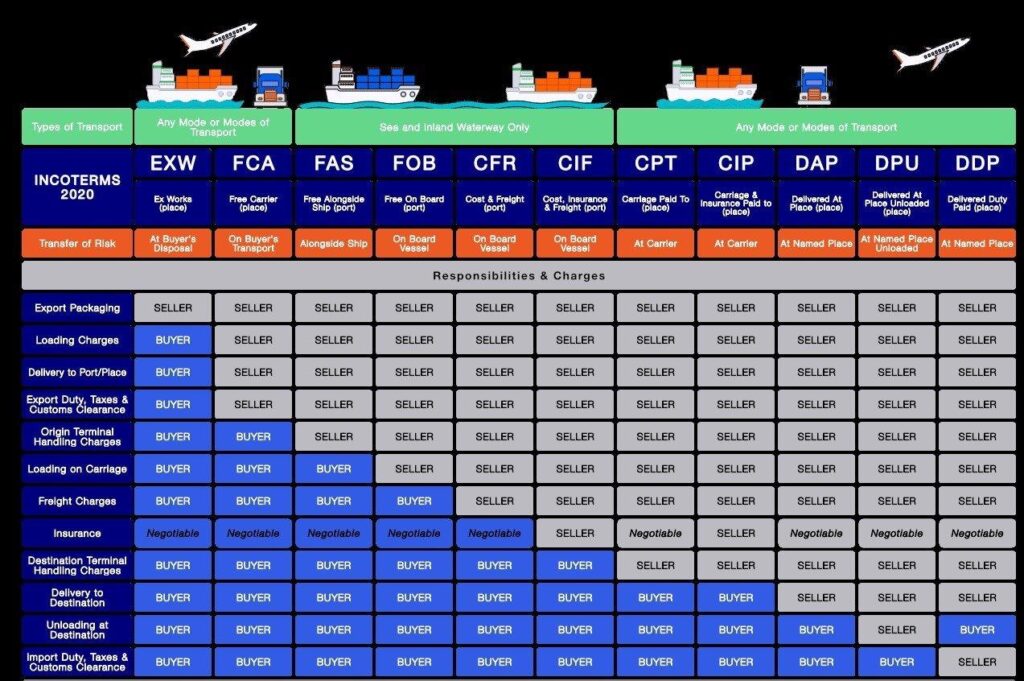- Home
- Incoterms
Incoterms

INCOTERMS is the name given to the program for the first time in 1936, when the International Chamber of Commerce (ICC) standardized the terms to create a common language in international business practices. INCOTERMS’s taking its current form has been possible with the changes made in certain periods.
What is INCOTERMS in general When asked, the answer that should come to mind should be "common language". The necessity of having a common language in international trade is to eliminate the binding of the local practices of the parties, to eliminate the difficulties that may arise from the differences in practice between the parties, and to ensure that the commercial transactions can be completed easily. INCOTERMS terms, which play a role in the fair sharing of costs and risks between the parties, also help to reduce the international problems that may occur between the parties. In international trade, the use of these terms facilitates reconciliation and prevents the emergence of disputes, since the resolution of disputes that may arise between the parties can be quite complicated in terms of both communication and legal process.
FCA has two subheadings, depending on the mode of shipment. In the case of using FCA in sea freight, the responsibility for the transportation of the tradable goods ended for the seller at the port. On the other hand, printing and sending the bill of lading was the responsibility of the shipper. With the current changes, the buyer company may have some new rights in INCOTERMS 2020. In this context, the buyer company, besides taking the transportation risk, had the right to include the delivery of the transportation bills to the seller by the carrier to the contract they made with the buyer. INCOTERMS 2010In Turkey, the exporting party becomes the responsible party in the absence or inaccuracy of any important documents, since its relationship with the shipping company ends as soon as it receives the goods, while INCOTERMS 2020 prevents this situation.
In the case of INCOTERMS, which came into effect in 2011, insurance policies are prepared at the minimum level of coverage for CIF and CIP shipments, unless otherwise agreed between the buyer and the seller. With INCOTERMS 2020, it was decided to insure at the minimum level of insurance applicable to the CIF. On the other hand, insurance for CIP shipments, including all risks, has been made compulsory. For this reason, the degrees of insurance responsibilities in CIF and CIP transports, which can be separated for delivery at the port in the buyer's country and delivery to the buyer's address, have been differentiated.
The term DAT (Delivery at Terminal) has gained a new name to become DPU (Delivery at Unloading Place) to indicate that the delivery address can be any point, rather than being limited to just one terminal. In this respect, the point that the selling party should pay attention to is that if the location where the goods will be delivered is not a customs point, it should be a location suitable for unloading the goods. This change is seen as an important update among the INCOTERMS delivery methods .
While DPU replaces DAT delivery method with current terms, it is not specified which party the insurance will belong to for DAP and DPU delivery forms in INCOTERMS 2020. This arrangement was not clearly stated in the previous terms either. Unless otherwise stated in the contract or proforma invoice between the seller and the buyer, the seller initiates the shipment without applying insurance. In this case, the buyer company is responsible for questioning the process, taking out the insurance for the safety of the goods and compensation in case of damage.
A more strict application of safety-related requirements has also been added to the INCOTERM 2020 rules. In this context, the additional costs incurred are also clearly revealed within the scope of the new terms. The buyer and seller are responsible for verifying the compatibility of these regulations with their own practices. In order to present a single cost list of the parties, all cost items based on INCOTERMS are included under A9 / B9 “Allocation of Costs”.
While DPU replaces DAT delivery method with current terms, it is not specified which party the insurance will belong to for DAP and DPU delivery forms in INCOTERMS 2020. This arrangement was not clearly stated in the previous terms either. Unless otherwise stated in the contract or proforma invoice between the seller and the buyer, the seller initiates the shipment without applying insurance. In this case, the buyer company is responsible for questioning the process, taking out the insurance for the safety of the goods and compensation in case of damage.
A more strict application of safety-related requirements has also been added to the INCOTERM 2020 rules. In this context, the additional costs incurred are also clearly revealed within the scope of the new terms. The buyer and seller are responsible for verifying the compatibility of these regulations with their own practices. In order to present a single cost list of the parties, all cost items based on INCOTERMS are included under A9 / B9 “Allocation of Costs”.
The responsibilities of companies in international buying, selling and transit trade practices are more clearly addressed within the scope of INCOTERMS 2020. The roles of the parties in terminal transactions have been finalized by considering the problems that have occurred to date and the situations that create a cost for the buyers and sellers as a result of these experiences. In addition, transactions related to transit goods were also discussed for the first time within the scope of INCOTERMS 2020.
In the creation of INCOTERMS 2020, the responsibilities and risks of the parties were comprehensively examined; The shipping process and the parties that undertake the risks related to the transportation are explained more clearly. In this context, 8 terms consisting of FCA, FAS, CPT, CIP, FOB and EXW constitute the delivery forms where all or part of the transportation responsibility belongs to the importing party. The terms that put the responsibilities on the exporter are accepted as DPU, DDP and DAP. The aim of determining the responsibilities fairly, which will facilitate the reconciliation between the parties among the objectives of INCOTERMS , is understood more clearly with this application.
Contact Us
We Giving You The Full Control to Complete Your Shipping Needs
Proin ullamcorper pretium orci. Donec nec scelerisque leo. Nam massa dolor imperdiet nec consequata congue idsem. Maecenas malesuada faucibus finibus. Donec vitae libero porttitor laoreet sapiena ultrices.

